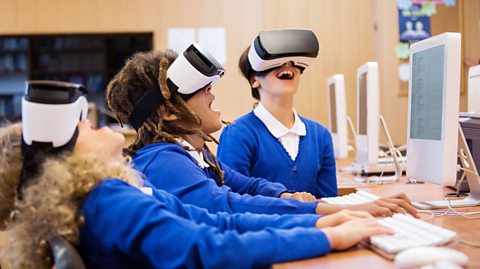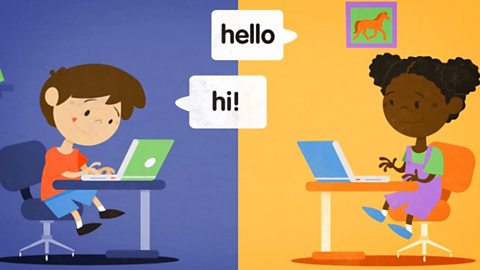
Emma Selby, clinical specialist nurse in children's mental health, shares tips on what parents and young people can do to scale back screen time.
Covid-19 has brought about many different challenges and changed the ways of working for everyone, including young people.
As classrooms moved to the living room and workbooks went online, increased screen time became something of an inevitability for millions of young people.
Being able to stay in touch with friends and family and to access learning resources online has helped many of us cope during lockdown. But parents trying to juggle their own work alongside supporting school work have not always been able to supervise children's online activity as much as they would like.
As we shift focus and begin to think about how to settle in to a different kind of normality, what can we do to help parents and young people consider the good, the bad and the ugly of the online world?

1. Social interaction
Let us start with a fair recognition that for many young people the online world has been something of a saviour for them during the months of lockdown. Socialisation is very important for young people and many have said that staying in contact with friendship groups through the use of digital media has helped them to look after their own mental wellbeing.
However, when socialisation is limited to text interaction, photo sharing or at best the odd video call, some skills can still take a knock. As we begin to think about the transition back to school in September, it is important for young people to begin revisiting some of these face-to-face social skills and getting back into healthy habits.
For younger children this can include encouraging activities within the family that prioritise sharing and turn-taking, whereas for older children slowly encouraging a shift towards face-to-face time with peers is important.
Consider safe activities, preferably outside, that could encourage them away from the screen and into social time with friends. A group bike ride, ball game or physically distanced catch-up in the garden are all good starting places.
2. Classroom reality
Access to computers for schoolwork has been more of a reality than ever for young people during lockdown, however returning to school in September will likely mean less screen time and more time hitting the books and writing by hand.
Some young people will have continued practising these skills during lockdown whilst others will have made less use of them. Encouraging children in their handwriting and reading skills ahead of September is great for getting them thinking about the reality of classroom learning again.
It does not have to be a structured lesson. Getting them to write out the shopping list, following a written recipe from a cookery book or reading the rules of a new game are all great ways you can recommend to parents to bring these skills into daily life.
3. Talking to young people
Young people today are often called 'digital natives' as many of them appear to be able to navigate technology better then most tech support lines and, as a result, parents and teachers can often feel dubious about talking tech with their children. They worry that they do not understand the nuances of the types of sites and platforms their children are using and do not want to ask extended questions.
Encouraging parents to ask more questions of their children and to get a better understanding of the types of platforms they like - and what they do on them - is a very important and very healthy part of building a relationship with the digital world. Embrace the fact young people tend to know more about the latest social platform and ask them to teach you more about their favourite online trends.
4. Safety online
Increased time online means increased opportunities for exposure to risk. Whilst there have been many benefits to using technology during lockdown, we are all too familiar with stories of young people who have been groomed online. However, online grooming is just one of a number of risks that must be understood and managed when using the internet.
Online gaming addiction, bullying, exposure to violence and even unintended access to pornography are all risks that need to be considered during this time of increased screen exposure. Many parents may be unaware that some sites presenting as online gaming sites may include ads for pornography for example, or that status questionnaires on social media can trick you into giving the answers to your security questions.
The conversation regarding online safety may differ slightly for different ages. Parents of young children should consider the parental controls they can apply to devices, and screen time should be monitored. Older children often have their own devices and are exploring issues around their own privacy, but this is precisely why talking to young people, as outlined above, is so important.
Parents should feel empowered to discuss, rather than to preach about, online safety with their young people, to ask questions of them to better understand how we all use the internet and spot the difference between 'safe' and 'not safe'. Regardless of age, parents should always be encouraged to know the access passwords for the technical devices in their homes in case of emergency. If they are worried about their childβs online use, they should encourage their children to show them what they have been doing. For parents who are unsure how to set parental controls on devices the NSPCC has a number of
5. Setting boundaries
Many parents have told me that they have allowed limits on screen time to shift slightly during lockdown. This has been for a variety of reasons, from home schooling, to boredom, to trying to manage their own home working and family expectations. However, it is important for there to be limits, as extensive screen time can effect childrenβs eye sight, sleep patterns and concentration span.
Routine and boundaries are important to help young people to set expectations, and therefore encouraging parents to reintroduce limits on screen access is important. Encourage parents to start by holding a conversation with children, explaining the move towards screen limits and what young people think is fair. This will help young people feel part of the discussion. Academic screen time can be moderated separately from leisure screen time, but it is important during both to take regular screen breaks, reducing screen use in the evening and keeping mobile phones out of bedrooms at night.
6. The long-term effects of screen use
We have just mentioned that extended screen usage can affect childrenβs levels of concentration, as screen use tends to be over- stimulating. As a result, you may find some of your students have difficulty maintaining pre-lockdown concentration levels when you return to classroom-based learning.
Parents can help with this before returning to school by encouraging children to take part in games or activities that they enjoy and require a longer period of concentration. This can include arts, building, music or baking but should encourage children to be in one place for a longer period of time focusing on one task. When you do return to the classroom, be prepared for some difference in concentration levels and try to build in regular concentration breaks where you can.
7. The real world and the digital one
One of the risks of increased digital time is that young people may have been more exposed to the constant news updates about the Covid-19 pandemic and the implications for health and safety. News posted online on websites and social channels does not always come from a reliable source and can be heavily edited for effect or even to encourage sales of a certain product.
As a result, many young people may have been overly exposed to unrealistic or βfakeβ news stories. For some young people, this may have increased their anxiety about returning to school as usual in September. Encouraging parents to have an open and honest conversation with young people about how they are feeling is a great starting place and exploring the realities of online news is important.
The digital literacy animation available on ΒιΆΉΤΌΕΔ Teach and ΒιΆΉΤΌΕΔ Bitesize's Fact or fake can be a great starting point for this conversation. If young people are anxious about returning to school, having a better understanding of where to get correct and up-to-date information about what to expect can really help.
8. Toxic productivity
During lockdown there has been a significant increase in the presence of something we call 'toxic productivity'. Toxic productivity is essentially the need to feel like you are enhancing yourself or your environment at the cost of all else. Social media has left many of us feeling like we must leave lockdown as world-class chefs, with excellent yoga skills and a pallet creation in the back garden.
Young people have been exposed to their own version of this and may have been left feeling that they have not βcreatedβ enough during lockdown, that they havenβt worked out enough or studied enough to keep up with the images they are seeing online. Itβs important to remember that what we see online, and what we experience in real life, are very different things and encouraging parents to hold healthy conversations about the truth of the βrealitiesβ portrayed online is incredibly important for building young peopleβs self-esteem.
When you return to the classroom you may find recapping the body image resources on ΒιΆΉΤΌΕΔ Teach helpful.

To mark Safer Internet Day, ΒιΆΉΤΌΕΔ Teach is releasing a special Live Lesson on Thursday, 9 February 2021 in partnership with the UK Safer Internet Centre, aimed at primary-aged pupils and linked to the primary computing curriculum. We learn about how we can stay safe, responsible and wise in an increasingly digital world, with tips and advice from some of the biggest personalities on the web. Find out more here.
For more advice and support
Parents and children can also find online safety tips and information at .
The can help kids enjoy the digital world and connect with friends much more safely. The keyboard offers guidance and support during online chat. Itβs free to download from the Googleplay and Apple app stores.
For more online safety resources on a wide range of issues, visit .
provides a wealth of resources, including information, advice and resources for parents and carers.
The provides a helpline for reporting harmful online content.
The ΒιΆΉΤΌΕΔ is not responsible for the content of external websites. By clicking the link to access the external websites you will be redirected to a site controlled by other organisations. Please note that the ΒιΆΉΤΌΕΔ is not the data controller of the personal data you enter into the external websites and it is not responsible for the services provided by any external organisation. When using an external website, you are subject to their Terms and Conditions and Privacy Policy.
Safer Internet Day - Live Lesson. video
In this Live Lesson in partnership with the UK Safer Internet Centre, aimed at primary-aged students and linked to the primary computing curriculum, we learn about how we can stay safe, responsible and wise in an increasingly digital world, with tips and advice from some of the biggest personalities on the web.

Live discussion: Safer Internet Day 2022 β All fun and games? Exploring respect and relationships online. video
This panel discussion programme for primary school teachers originally broadcast live on Tuesday, 1 February 2022. This was an opportunity to share ideas and best practice ahead of Safer Internet Day 2022. The panel was hosted by Naomi Wilkinson β a regular face on CΒιΆΉΤΌΕΔ and ΒιΆΉΤΌΕΔ Teach Live Lessons β and included teachers and experts.

Safer Internet Day - Teaching Resources. collection
A collection of teaching resources that can be used to explore online safety with both primary and secondary pupils. These classroom resources can be used to educate pupils on using technology safely, respectfully and responsibly.
